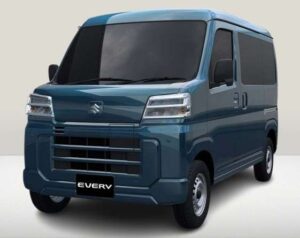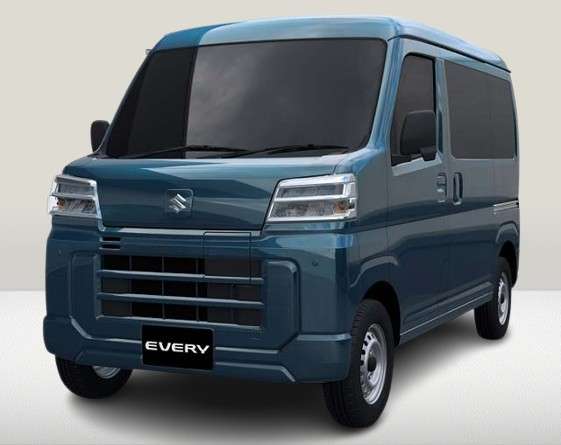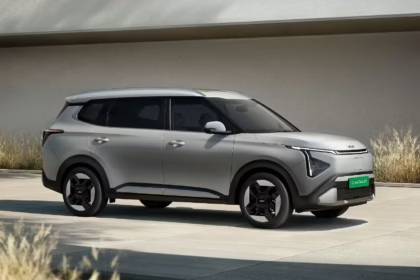A new battery-powered mini commercial van enters the electric vehicle (EV) market which Suzuki Daihatsu and Toyota are preparing to launch. The newly developed EV model ensures better eco-friendly and efficient deliveries at the last mile stage.
- A Strategic Partnership for Sustainable Mobility
- Features of the Mini Van EV
- The Role of Suzuki Daihatsu and Toyota in the EV Market
- The Impact on the EV Industry
- Boosting Small Business Logistics
- Enhancing Urban Transportation
- Strengthening Japan’s EV Market
- Driving Global EV Adoption
- Reducing Carbon Footprint
- Future Outlook
- Conclusion
- FAQs
Through the unification of Suzuki Daihatsu’s expertise in producing small vehicles along with advanced battery resources from Toyota, the companies intend to develop an accessible commercial solution for businesses.
The company expects to release its Mini Van ev commercially in the financial year 2025. The future of transportation relies heavily on electric vans since cities have increasingly crowded conditions and growing emission regulations.
Suzuki Daihatsu and Toyota have formed a significant partnership that leads to advanced sustainable transportation systems. This vehicle features a small design with effective battery operation and budget-friendly rates which suits businesses needing delivery services in cities and towns. This launch represents a significant advancement in sustainable transportation because EV demand continues to increase in the market.
A Strategic Partnership for Sustainable Mobility
Japanese companies Suzuki Daihatsu and Toyota operate together to create a brand-new electric mini commercial van. The electric Mini Van has been specifically designed to satisfy rising market needs for sustainable low-mileage transportation vehicles. The business aims to produce an affordable and dependable EV through the collaboration of Suzuki Daihatsu’s small-vehicle expertise with Toyota’s cutting-edge electric technology.
The Mini Van EV results from a partnership between Commercial Japan Partnership Technologies Corporation (CJPT). The sustainable transport solution initiative was launched by Toyota in 2021 in partnership with local commercial vehicle manufacturers Hino and Isuzu and other participants. Suzuki Daihatsu entered the partnership in that same year to contribute their skills in producing small cars.

View the 22 latest electric car debuts preparing to launch at Bharat Mobility Expo 2025 to see EV industry advancements.
Through their combined initiative these firms aim to develop an affordable electric commercial vehicle that supports responsible transportation for businesses. This Mini Van EV will become available in 2025 as an essential move to cut carbon pollution while establishing sustainable commercial vehicle systems.
Features of the Mini Van EV
The soon-to-be-released battery-powered Mini Van EV will incorporate advanced technology to optimize efficiency and affordability. Key features include:
- Compact and Lightweight Design: Ideal for maneuvering through urban environments and narrow streets.
- Enhanced Battery Efficiency: Toyota’s expertise in battery technology ensures an extended range and reduced charging times.
- Optimized for Last-Mile Logistics: Designed to cater to businesses that rely on efficient delivery services.
- Affordable and Sustainable: By leveraging the strengths of Suzuki Daihatsu, the vehicle will be competitively priced while maintaining environmental sustainability.
- Improved Safety and Connectivity Features: Cutting-edge safety technology and smart connectivity enhance the driving experience.
The Role of Suzuki Daihatsu and Toyota in the EV Market
For multiple years the automobile industry of Japan has maintained Suzuki Daihatsu mini van and Toyota MiniVan as dominant participants. Since the global energy industry moves towards sustainability these companies develop their range of electric vehicles at an accelerated pace. The growing demand for environment-friendly transportation allows Suzuki Daihatsu and Toyota to develop less expensive and more efficient electric vehicles because of government backing.
The experience of producing economical compact vehicles at Suzuki Daihatsu makes them an ideal match for Toyota’s innovative EV technology. The companies work jointly to establish practical alternatives that deliver sustainable mobility options.
Daihatsu encountered significant setbacks through an emissions certification scandal that forced them out of the Commercial Japan Partnership Technologies Corporation (CJPT) during the first months of 2024.
Suzuki Daihatsu and Toyota maintain their dedication to carbon emission reduction and greener vehicle promotion as part of their shared strategy. The company’s dedication will boost Japan’s carbon neutrality goals while influencing how electric transportation develops across the whole world.
The Impact on the EV Industry
A newly introduced battery-powered mini commercial EV van from a collaboration between Suzuki Daihatsu and Toyota will create substantial effects across various industries. The business advantages from this collaboration between Suzuki Daihatsu and Toyota will extend to carbon neutrality goals by fulfilling rising market needs for efficient last-mile delivery and sustainable transportation. This text examines the extensive effects of this modern electric vehicle van along with its impact on upcoming mobility trends.
Boosting Small Business Logistics
Small and medium-sized enterprises throughout the world strongly depend on efficient logistics solutions to deliver products to their customers. The Suzuki Daihatsu and Toyota collaboration introduces an expected Mini Van EV that will revolutionize SME operations through economical and efficient battery power combined with reduced operating costs.
- Lower Operational Costs
The expense for business vehicle fuel together with upkeep poses a substantial obstacle for small logistics operations. The adoption of electric vehicles (EVs) creates financial benefits because they enable businesses to pay no gasoline costs and decrease component deterioration. Total ownership expenses for the Suzuki Daihatsu and Toyota Mini Van EV remain low which drives business operators to choose this solution.
- Improving Delivery Efficiency
The surge of e-commerce activities as well as online shopping demands increased attention to last-mile delivery systems. Privileged delivery speeds combined with eco-friendly operations will characterize the upcoming Mini Van EV from Suzuki Daihatsu and Toyota. The Mini Van EV from Suzuki Daihatsu and Toyota will receive design modifications for optimum performance on urban and suburban delivery pathways according to their specifications for business supply chain efficiency.
Enhancing Urban Transportation
The continuous rise in urban population leads urban transportation to face mounting problems related to pollution and traffic congestion. The government promotes electric vehicles as a comprehensive answer to minimizing air pollution and emission emissions. The Suzuki Mini Van Daihatsu and Toyota mini EV van is designed specifically to tackle urban pollution through its small size matched with electric power capabilities.
- Reducing Urban Emissions
The growing number of urban LEZs restricts and imposes additional fees on standard vehicles powered by gasoline or diesel. This Mini Van EV model enables business activities in LEZs giving free access to sustainable transportation operations.
- Perfect Fit for Narrow City Roads
The Suzuki Daihatsu and Toyota mini EV vans were built specifically to enable navigation of small streets and crowded urban areas instead of filling the role of large commercial vans. Small baseline vehicles turn out to be the optimal choice for urban organizations together with delivery providers as well as ride-sharing platforms seeking compact vehicles.
Strengthening Japan’s EV Market
As a premier force in automotive production Japan continues its logical shift towards EV technologies. Japanese automakers Suzuki Daihatsu and Toyota together with their deep investments in electrification contribute to the forecasted explosive expansion of the local EV market.
- Expanding EV Infrastructure
The increasing EV market needs an extensively developed charging infrastructure network. Suzuki Daihatsu and other auto producers collaborate with Japanese government departments and private energy enterprises to build extensive EV charging station networks within their country. The implementation will push businesses together with consumers toward adopting electric vehicles as their primary choice.
- Investment in Battery Technology
The adoption of EVs has faced severe challenges due to existing limitations of battery technology. Toyota together with Suzuki Daihatsu maintains its investment in next-generation battery technologies which improves electric driving range while speeding up charging along with boosting energy utilization in their vehicles. The innovative measures will provide advantages to the Mini Van EV along with enhancements in electric vehicles that will arrive in their future product line.
Driving Global EV Adoption
The Suzuki Daihatsu and Toyota mini EV vans presently target Japan as their first market but have vast international growth possibilities. Developmental economies together with established market countries hunt for economical and environment-friendly commercial vehicles.
- Targeting Developing Markets
The combination of expensive fuel expenses and serious urban traffic congestion makes electric commercial vehicles stand as an appealing transportation solution in these settings. The combination of recognized client trust toward Suzuki Daihatsu and Toyota in terms of affordability and reliability positions these brands perfectly to access new market opportunities across Asia, Africa, and Latin America.
- Potential Expansion into Europe and North America
Zero-emission policies adopted by European and North American cities have led them to promote the adoption of EVs. A successful performance of the Mini Van EV in Japan would enable Suzuki Daihatsu and Toyota to launch an affordable electric commercial vehicle option in different markets.
Reducing Carbon Footprint
The push for environmental sustainability served as a main driving force for electric vehicles and the Suzuki Daihatsu and Toyota Mini Van EV provides a necessary component in reducing automotive industry carbon emissions.
- Lower Emissions Compared to Fuel-Based Vans
Traditional gasoline and diesel-powered vans significantly increase air pollution together with their emission output. Motor and commercial operations that switch to electric alternatives establish a substantial impact toward diminishing their environmental impact.
- Sustainable Manufacturing Practices
Suzuki Daihatsu and Toyota combine their efforts to develop environment-friendly vehicles and plants that produce these vehicles. The companies work through their supply chain to increase the use of renewable production energy and implement recyclable materials as part of their commitment to green business operations.
Future Outlook
Suzuki Daihatsu and Toyota will release their new mini EV van into production during the 2025 financial year for future compact electric commercial vehicle developments. This joint venture between Suzuki Daihatsu and Toyota represents a primary move toward emission reduction and urban mobility advancement during the global conversion to green transportation.
Sustainable vehicle demand continues to grow so Suzuki Daihatsu together with Toyota work to fulfill this market requirement. The companies aim to develop electric vehicles that businesses find affordable and both functional and efficient.
The small electric commercial vehicle features a design that enables logistics operators to execute efficient and environmentally beneficial final distribution services.
Suzuki Daihatsu along with Toyota intends to dedicate more research funds to superior battery technology development for achieving longer driving distances with faster charging capabilities. Manufacturers who adapt their products to new emission rules will control the market since governments implement tighter enforcement.
Through continuous research and development, Suzuki Daihatsu and Toyota intend to extend electric car accessibility to develop a sustainable future of transportation.
Conclusion
The Mini Van EV development by Suzuki Daihatsu together with Toyota brings major progress toward sustainable urban transportation systems. A combination of Suzuki Daihatsu and Toyota strengths produces this vehicle which presents a sustainable and cost-effective answer for lightweight delivery operations. The expanding EV industry demands such cooperative ventures which will determine how transportation evolves in the future.
The EV market worldwide faces an important transition point with Suzuki Daihatsu and Toyota functioning as leading drivers of change. The project combines innovation with investment and sustainability to reach the target of carbon neutrality. The move to clean transportation creates mutual advantages for companies and their end-users.
Disclaimer
The article relies on existing reports and industry statistics for its information. These specifications together with release dates might undergo alterations. Refer to Suzuki Daihatsu and Toyota official announcements for obtaining up-to-date information about this EV project.
FAQs
When will the Suzuki Daihatsu and Toyota Mini Van EV be released?
The battery-powered mini commercial van will enter manufacturing during the 2025 financial year ending in March of 2025.
What makes this Mini Van EV different from others?
Suzuki Daihatsu applies its manufacturing excellence to compact models while drawing on Toyota’s state-of-the-art electric technology at affordable price points.
Will the Mini Van EV be available outside Japan?
The Japanese market will receive the initial manufacturing focus although global plans may follow if market needs arise.
What is the main purpose of this vehicle?
The Mini Van EV exists for delivery use between the final two stops promoting environmental responsibility through lower costs and emissions.
How does this collaboration contribute to carbon neutrality?
The collaboration between Suzuki Daihatsu and Toyota produces electric commercial vehicles that diminish emissions while developing sustainable vehicle technologies.





